
After graduation in May, Macalester grads have been busy settling into new lives and careers. We caught up with six of them to learn about life after Mac.
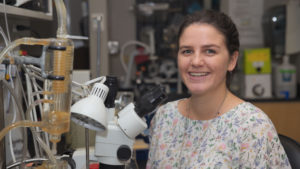
Gianna Bortoli
Biology major
Current Position and Location: I’m a research technologist at Johns Hopkins University in the Department of Medicine, Division of Cardiology in Baltimore, Maryland.
How I got my job: During my junior year I applied for a Special for Mac Opportunities research position at Johns Hopkins University through the Olin-Rice Hub. I spent 10 weeks in a molecular biology lab studying mitochondrial CaMKII. When the internship ended, I remained in close contact with my supervisor and expressed my interest in continuing research upon my graduation. During the spring of my senior year the lab extended an offer for a one-year appointment.
What my average day looks like: I arrive to the lab around 8:30 a.m. and check in with the other technologist about experiments that need to be done for the general lab, check on our mice colonies, and look for general housekeeping around the lab. After, I check with the postdoctoral researcher I collaborate with for preparation of upcoming experiments and reviewing data from experiments we’ve completed. Usually I’ll have planned out several experiments for the week which vary from a couple minutes to several hours/days. Other daily tasks include attending lectures, presenting at lab meetings, and reading research papers regarding the lab’s main molecule of interest, CaMKII.
Lessons from Mac: One of the greatest lessons Mac taught me was the importance of adaptability. Macalester was both my harshest critic and greatest supporter and there were many times when guidance from professors included constructive criticism as well as words of encouragement and brainstorming. Macalester aided me in becoming adaptable: adaptable to new jobs, difficult tasks, and broader ideologies.
Downtime activities: In my downtime I have been practicing French, going for long runs, volunteering at the Boys and Girls Club, reading nonacademic books, exploring new restaurants, and making new friends.
Knowing what I know now, this is the advice I would give myself as a college senior: Don’t limit yourself to staying in the field of your major. If you’re interested in positions outside of your major you should pursue them and talk with your advisor about making a field switch. With the large alumni network you are bound to find someone who will be able to connect with you.
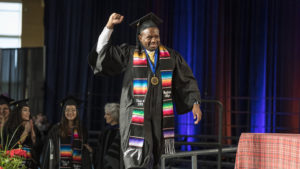
Malik Mays
Chemistry major
Current position and location: I am currently a first-year medical student at The University of Toledo College of Medicine and Life Sciences (MD program).
How I got my current position: The medical school application process was about 10 months for me. I took the MCAT at the end of my junior year at Macalester and accepted the offer from the University of Toledo COMLS in April 2019. I received so much support and guidance from Macalester faculty and staff throughout the entire process.
What my average day looks like: One of the biggest differences from my time at Macalester is the stark increase in how much time is dedicated to studying everyday. Usually, I have class for about three hours in the morning. The afternoons are usually free for studying or there is a scheduled lesson for Principles of Clinical Medicine (PCM). PCM activities can include interview skills practice, discussing the business aspect of medicine, learning physical exam basics, etc. On average, I would say that I study about 7-10 hours each day.
Lessons from Mac: One of the best lessons I learned from Macalester is the importance of self-care. I always try to remind myself that you can’t fill anyone else’s cup if yours is empty. Self-care always has to be priority and the best time to start making it one is now.
Downtime activities: I like to use my downtime to exercise and catch up on my sleep. Downtime is sometimes hard to come by in medical school.
Knowing what I know now, this is the advice I would give myself as a college senior: If you are interested in pursuing a career in medicine, be honest with yourself and do what you believe will put in the best position for success. Whether that’s taking a few years off after Macalester or exploring multiple career paths, focus on your journey and do not feel like you have to have it all figured out at this very moment. Also, if you have a goal in mind, it will happen. It may not happen the way you pictured it, but you eventually end up exactly where you are supposed to be.
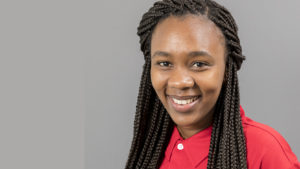
Temusa Rukundo
Economics and political science majors
“I am very glad that Macalester put such a huge emphasis on networking and seeking opportunities.”
Current position and location: I’m an analyst for Analysis Group (AG) in the Boston office.
How I got my current job: I applied to AG after they came to campus to give a talk about the company. After submitting my resume, I had an on-campus interview with AG which led to me being invited to Boston for a second-round interview. After that interview, I almost instantly knew that AG was where I wanted to be. Fortunately, they gave me a job offer, which I gladly accepted. Now, I have been working there for the past two months.
What my average day looks like: My typical day starts at around 9 a.m. and what I love the most about my job is that, honestly, each day is different. However, I would say it involves some combination of meetings, data analysis and exploration, writing, and training. As an analyst, my job heavily involves working with data, whether that be data exploration, analysis, and/or production of output to present. Additionally, the work we do at AG is all done in case teams, so it’s not unusual to have multiple formal and informal meetings with case team members throughout the day. On the other hand, as a new employee at AG, there is still a lot of learning and training which happens. So, a couple of hours of my week are spent on formal training material, or teaching myself new skills which I need to apply to the case work I am doing. Generally, the allocation of time to each of these activities depends on the needs of each of the cases that I am working on.
Lessons from Mac: Top three: 1. Amy Damon’s Introduction to Econometrics class. I literally use the skills that I learnt in that class on a daily basis! 2. AG functions on what is called the open labour market, which means that networking is very important if you want to find out about the various cases going on in the firm, and meet the people who will bring you on to work on the cases that are of interest to you. So, I am very glad that Macalester put such a huge emphasis on networking and seeking opportunities. 3. The liberal arts education provided me with the ability to think and reason about issues in various contexts. The work we do at AG is very multidisciplinary, so it’s very useful to be able apply those critical thinking skills in my daily work.
Downtime activities: I love traveling, exploring the city and trying new restaurants, and binging on crime and investigation TV shows and podcasts.
Knowing what I know now, this is the advice I would give myself as a college senior: I would tell myself to actually believe in the affirmations and Bible verses I have been telling myself. That I should not be stressed out and anxious because I have done my part and everything will work itself out.
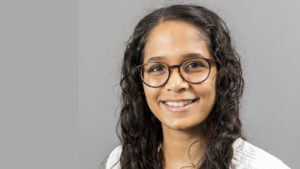 Alya Ansari
Alya Ansari
Media and cultural studies major, critical theory concentration, linguistics minor
“A big part of my respect for my time at Macalester has been how the Mac community has helped me decide to choose to be positive, and hopeful, and excited, in and about a world that is consistently difficult, unfair, and disappointing.”
Current position: PhD candidate, Department of Cultural Studies and Comparative Literature at the University of Minnesota.
How I got my current position: I applied to graduate programs during the fall of my senior year and heard back in the spring. From very early on during my time at Macalester it was clear to me that I wanted to pursue a career in academia, and I felt incredibly supported in this endeavor by both my faculty advisors and peers. After a long and highly competitive application process, I was accepted with tuition fully covered, on top of which the University of Minnesota pays me a salary, health benefits, and fellowships.
What my average day looks like: My average day at the U is not unlike what my days looked like at Macalester, ironically enough. I find myself in a seminar a day, usually followed by the usual mix of TA-ing, homework, and procrastination…
Lessons from Mac: This is such a difficult question to answer, because I consider myself the product of the sum total of the experiences had and friendships nurtured during my time at Macalester: any one lesson seems flattening to the diversity of things I learned at 1600 Grand. It was perhaps most significant that I began to establish a relationship to myself (through encounters with friends, professors, and, most importantly, peers who disagree with me) during my time at Mac—figuring out how I want to live my life, conduct my relationships to other people, what issues (social, political, personal) really matter to me, and generally how I want to exist in spaces deeply conditioned by relations of power and inequality. A big part of my respect for my time at Macalester has been how the Mac community has helped me decide to choose to be positive, and hopeful, and excited, in and about a world that is consistently difficult, unfair, and disappointing.
Downtime activities: Though it’s hard to believe, I actually enjoy reading despite the amount of reading I do for graduate school. I’ve also kept up with many of the fitness routines established for me during my time on the track and field team—exercise contributes immensely to my mental well-being. And going to the movies! God, I love the Twin Cities cinema scene.
Knowing what I know now, this is the advice I would give myself as a college senior: Cut yourself some slack. Even when it feels like you’re hurtling towards a future that is almost entirely nebulous and uncertain, you’re actually more prepared than you think. Macalester’s program is far more rigorous than any of us realizes, and there’s a whole community of alums waiting to give you a leg up into the next stage of your life!
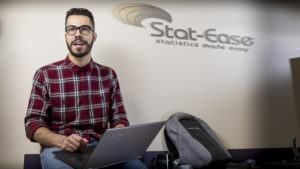
Fouad El Hamdouni
Computer science and economics majors, Spanish minor
“Things after graduation can be unpredictable. Therefore, don’t live too much in the future and enjoy your time with the community that you’ve built at Mac. “
Current position and location: Intelligent automation consultant at EY in Boston.
How I got my current job: Last year, I attended a tech conference and met the recruiters during the career fair day. They took my resume and followed up with me after the conference.
My average day: My days have been pretty busy since I am on a global project. I typically take calls everyday at 6 or 7 a.m., head to the office around 9 a.m. and work throughout the day until 7 or 8 p.m., and take calls at midnight to accommodate time zones.
Lessons from Mac: Many of the things that I am doing right now are new to me, but I think I was able to build a good foundation at Mac through classroom and outside of the classroom experiences to learn quickly and use the resources available.
Downtime activities: Due to the unpredictable schedule, I haven’t been able to build a routine. However, I try my best to catch up with friends over the weekend, and explore the city.
Knowing what I know now, this is the advice I would give myself as a college senior: Advice 1: Take a step back to see the big picture of what you want to do and evaluate your options carefully to find the best fit for your goals and aspirations. Advice 2: Things after graduation can be unpredictable. Therefore, don’t live too much in the future and enjoy your time with the community that you’ve built at Mac.
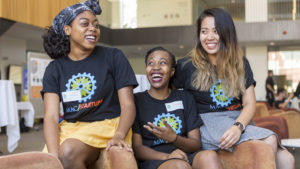
Gloria Odoemelam
Economics and applied mathematics and statistics majors
“I find that at work, I’m constantly drawing from my experiences in Machine Learning, Intro to 2D Design, and even Portuguese classes that I took at Mac.”
Current position and location: Associate product marketing manager at YouTube in San Bruno, Calif.
How I got my current job: I’m currently doing a rotational program at Google called the Associate Product Marketing Manager (APMM) Program geared toward new and recent grads interested in marketing careers. I saw the job posting on Twitter from someone in the program, reached out to them and applied. Based on my skills, I was then placed on the YouTube Subscriptions Marketing team, focusing on YouTube Music and Premium.
What my average day looks like: I start my day at the gym, then go to breakfast, and on some days I’ll have meetings with my team but if not, I go into data analysis work. This part of my work has really been aided by skills I learned at Mac as an economics and applied mathematics and statistics major. In this work, I am answering strategic questions for my team such as opportunity sizing in different markets.
Lessons from Mac: Anything can be interdisciplinary! I didn’t have any previous experience in marketing before my job, but I find that at work, I’m constantly drawing from my experiences in Machine Learning, Intro to 2D Design, and even Portuguese classes that I took at Mac.
Downtime activities: Since I’m still getting acquainted with San Francisco and the Bay Area, I spend many weekends exploring different restaurants in the city. The balance between nature and city life in San Francisco is great, so on Saturday mornings, I often hike up one of the summits nearby to get a great view of the city—this is something I never imagined myself doing!
Knowing what I know now, this is the advice I would give myself as a college senior: Although classes may get overwhelming, get into the habit of taking time for yourself, whether it’s 30 minutes or an afternoon on the weekend to focus on something you’re interested in. This could be anything from reading a new book to building a new skill set. Forming this habit can really help post-grad to keep you accountable to dedicating time for yourself—finding motivation to do this once I started working has been harder than I expected.
November 5 2019
Back to top




